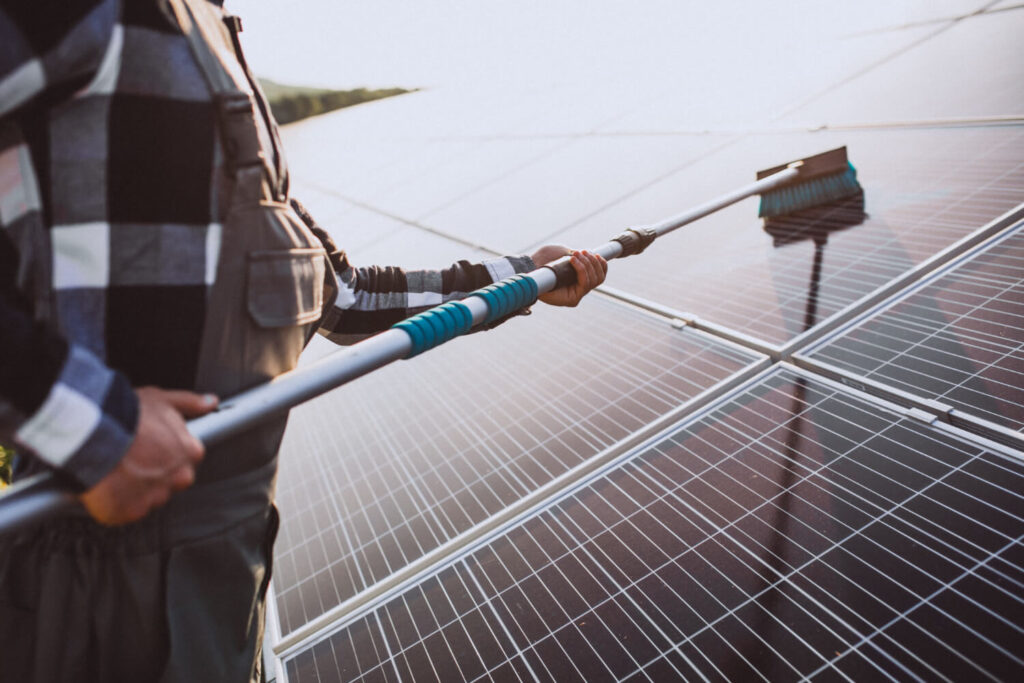
Once you have installed solar panels, it makes sense that you will want to keep them in optimum condition to get the most out of your investment. The good news is that solar panels are designed to be low maintenance and only require basic cleaning to clear dust and debris. Cleaning solar panels can be very straightforward if you follow a few simple tips. Alternatively, there are some excellent solar panel cleaning services out there if you prefer to outsource the task. They can also usually carry out routine maintenance and servicing inspections, including inverter checks and battery performance, at the same time.
Either way, it is important to keep on top of routine cleaning and maintenance. It helps enormously with improving energy production, keeping the panels looking nice and protecting the whole system from damage and dirt. Before you set about hiring solar experts, take a look at the following routine care tips and cleaning techniques.
Timing is everything
You should aim to clean and maintain your solar panels at least twice per year. This will help with ensuring peak performance. The job should be done at the end of autumn to clear away any leaves or dirt left on the panels by the rain. Then, it should be repeated at the end of spring to get them as clean as possible before the strong rays of summer sunshine start to hit. If you live in a dusty area, or in the countryside, where there may be more pollen, you should look at cleaning and maintaining solar panels every three months. Choose an overcast day to clean and carry out maintenance. Good times of day include early morning or late evening when there is less (or no) sun hitting the panels. Do not work on them during excessive heat, rain, snow or high winds.
Pre-checks and visual inspection
Before starting work, do a thorough check of the solar panels to see if there is any damage or other issues needing urgent attention. Look for cracks, breaks or loose connections. You may need to call in an expert if there is serious damage or dirt needing to be shifted. Do not put yourself in danger trying to fix difficult issues yourself or climbing on rooftops to access tricky areas. If the panels are tilted, this will make it easier to inspect and clean them. Rain will also wash away dust and debris (to a certain extent) from tilted panels. If any sections have come away from the roof, you will generally need to have them reattached by a professional solar panel maintenance company. Do not attempt to repair the panels yourself in the name of making cost savings. This can not only be dangerous, but it can also invalidate the manufacturer’s warranty.
Gently does it
Never use an abrasive soap or sponge to clean your solar panels. Instead, use plain, lukewarm water, or a mild detergent that has been specially formulated for the job. Use a soft brush or cloth to rub away any stubborn dirt, taking care not to scrub too hard. This could cause corrosion or scratches to the panels and lead to problems for the inverter and connections. If you clean your solar panels regularly, you should be
able to get away with a gentle clean like this, or even just run a hose across the surface to get rid of any surface dust and debris. Allow the solar panels to air dry. If there is a lot of residue water, wipe them gently with a dry, microfibre cloth. Use a brush or cleaning pole with a long, extendable handle and clean from the ground for maximum safety.
Post-cleaning and maintenance checks
Once you have finished inspecting, cleaning and arranging solar panel maintenance, you should make a note of the date the task was completed, as well as any additional repair or upgrading work that was carried out. This will help you work out when the next clean and maintenance is due. Keep an eye on the inverters to make sure they are flashing green. This helps you with ensuring peak performance after the solar panels have been checked and cleaned. Take a quick look every day to check for anything obvious. Monitor your energy usage and battery storage statistics to make sure that you are generating the amount of electricity that you are expecting to. If anything looks unusual, then book a professional maintenance and/or repair.